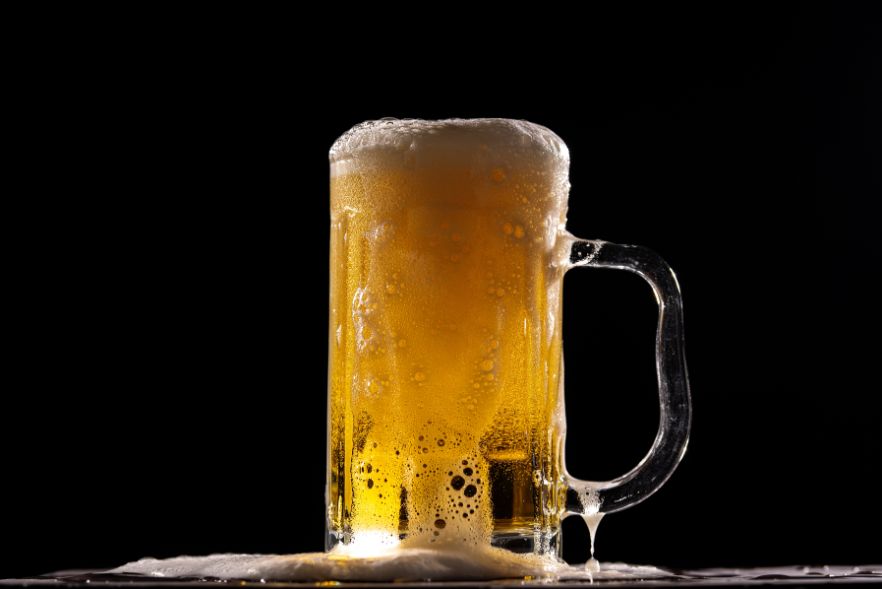It appears that many people believe a beer to be as delicate as a $200 bottle of wine. You must store it just so or it will turn. Read this post to find out whether beer can go bad from cold to warm back to cold.
Beer does not spoil if it goes from cold to warm to cold again, contrary to what is commonly believed. While it’s true that cold beer keeps better, especially if it’s a hoppy brew, the beer is unaffected if it’s taken out of the fridge and allowed to come to room temperature before being further chilled.
Is It Acceptable To Allow The Beer Go From Cold To Warm Back To Cold?
A lot of people appear to believe that beer is just as delicate as a $200 wine bottle. It must be stored precisely to avoid turning. The beer temperature myth goes something like this: If a beer has been chilled, then allowed to warm up, then gets cold again, etc., it will be ruined and undrinkable. A beer will smell bad if it is repeatedly cooled and warmed.
Actually, there’s nothing skunky about letting a cold beer warm up. The majority of beers have a short shelf life and, depending on the beer, may lose their freshness after a few months to a year. UV light and the ensuing photo-oxidation, however, are the biggest bogeyman for beer.
However, beer isn’t particularly sensitive to temperature changes. The majority of the beer you purchase was most likely once chilled. Although most beer is kept cold during shipping, not all beer is kept in the cooler once it arrives at the retail location. At room temperature, some are kept and sold. The beer is not harmed by this. Small brewers might not, however, be able to afford the price of cold shipping.
The taste of a beer won’t typically be significantly impacted by going from cold to room temperature and back. So, is beer able to be refrigerated again? Yes, beer must remain chilled after being chilled. Really, it’s not that difficult to move it from the refrigerator to room temperature and back again. Naturally, you wouldn’t want to repeat this, but it’s still useful if you have any warm beer left over. Later, enjoy it by placing it back in the refrigerator. You may be interested in ice beer.
Is It Possible To Chill Beer Before Unchilling It?

The most widely accepted version of the beer temperature myth states that if a beer is chilled, then made warm, then cooled again, etc., it will become spoiled and unusable. It is a myth that skunking entails allowing a cold beer to warm up.
How Long Does It Take To Chill Beer In The Fridge?
If you’re fortunate enough to have planned ahead and you have 7-8 hours before you want to drink the beer, simply place the room-temperature beer bottles or beer cans right in the refrigerator. In 7-8 hours, beer will cool from room temperature (roughly 70 degrees) to drinking temperature (roughly 40-45 degrees).
This isn’t a great option for someone who wants a beer right now or in the next hour because it takes so long. So, while you use other methods to quickly chill a beer, make sure you put a few more in the refrigerator for tomorrow! In fact, if you’re trying to quickly chill a whole case of beer or even a six-pack of beer, it might make sense to use one of the following techniques on a few bottles before storing the remaining beer in the refrigerator to be consumed later.
Further Reading: How Long For Beer To Get Cold In Freezer?
Does Beer Need To Remain Cold?
All beers should always be kept in the refrigerator for the best storage. It is necessary for almost all draft beers and many craft beers. Foods age more quickly and acquire off flavors more quickly when they are not refrigerated. The 3-30-300 Rule was created in response to a study on flavor loss by bottled and canned goods done by a large brewery.
Does Beer Go Bad If It Isn’t Refrigerated?
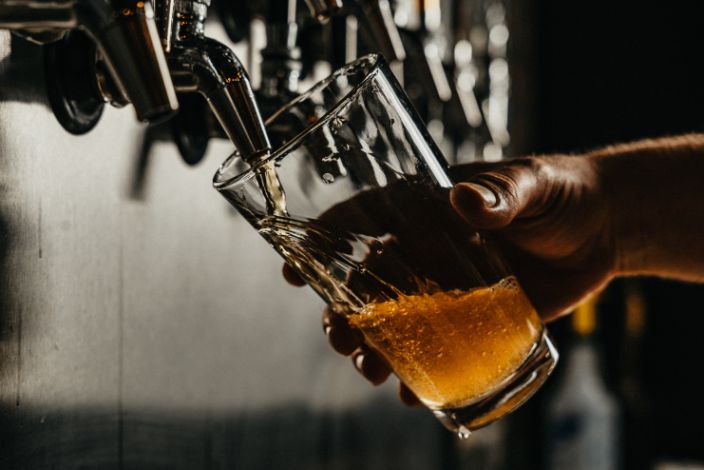
Beer can be kept at room temperature if the house isn’t overly warm. Beer slowly loses quality in a warm environment. If not being served as soon as possible, the beer should be kept in a cooler. It’s a good idea to always keep draft beer cold.
If It Gets Hot, Is Beer Still Good?
Certainly, a beer’s flavor can suffer from being exposed to higher-than-normal temperatures for an extended period of time. Actually, heat itself doesn’t produce a particular off-flavor. Accordingly, a beer sitting at 60 degrees Fahrenheit will maintain its flavor for a lot longer than a beer sitting at 90 degrees.
Does Beer Stink As It Warms Up?
Warm storage does not skunk beer, but it does harm the flavor. Also excluded is the practice of changing the temperature of beer from warm to cold and back again. Beers sold in kegs, cans, and opaque bottles cannot be skunk because light is a requirement for the process.
Does Hot Weather Cause Beer Go Bad?
Going from cold to warm will not have a significant impact on beer, but extreme heat will have a negative impact. Therefore, what matters is just how warm the warm temperature is, not the change in temperature.
The bottle and beer will heat up considerably if you remove them from an ice-filled cooler at the beach and leave them in the sun and heat for several hours. Increased temperature and potential light exposure (depending on the bottle) will hasten oxidative reactions in the beer. The effect will worsen as the beer is left in these high temperatures for a longer period of time.
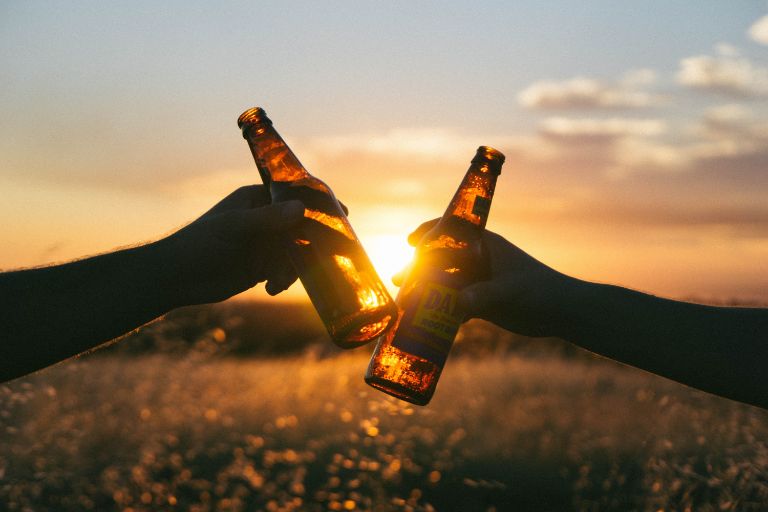
Given the foregoing, it makes sense that storing beer at cooler temperatures will usually result in a longer period of time during which it is still drinkable. Beer can be kept at room temperature until you need to chill it for drinking, but storing beer in the fridge is usually a good idea, especially if you plan to drink it all within a month or two. Keep in mind that the refrigerator is a dark, cold place. If all else fails, choose a cool, dark location, such as a lower cabinet, or, if your basement typically stays cooler than the rest of the house, a location there.
All of this clarifies why beer is typically shipped cold. Beer’s flavor will not be significantly changed by allowing it to warm to room temperature and then cooling it again, but if beer is shipped without refrigeration, it may be exposed to extremely high temperatures.
In the middle of the summer, beer left uncooled in a truck will probably get much too warm. Even days may pass while it swelters in the extreme heat. By the time the beer gets to the retail location, this will reduce its enjoyment period and may change the flavor.
However, if you stop to think about it, while beer brewed and sold within the United States may remain cold during shipping, all the way to the retailer, beer imported into the United States from Europe or elsewhere is very unlikely to make it here without changing temperature quite a few times, from cold to warm to cold to warm again. Even so, I enjoy drinking Czech, German, and other beers. That is not skunked all the time.
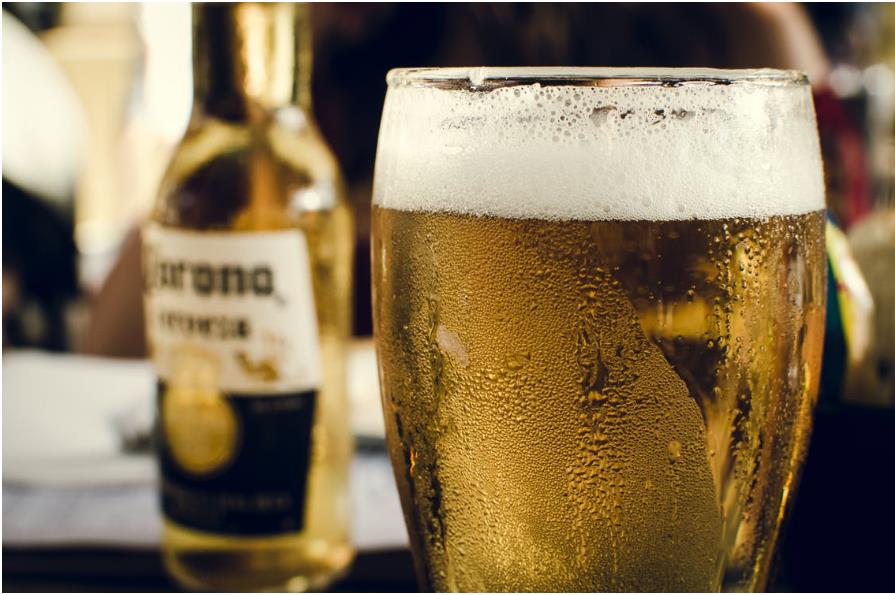
How Much Time Can Beer Be Left At Room Temperature?
Since prolonged exposure to heat and light can result in some unpleasant off-flavors that can ruin your beer, you’ll want to make sure that your beer is kept in a cool, dark spot in your pantry if you decide to store it unrefrigerated.
Beer can keep unopened for a very long time at room temperature. Beer that is properly stored, unopened, and kept at room temperature should be fine after 4 to 6 months, during which time it will generally be at its best.
Other factors that can affect the longevity of your beer are:
- Oxidation: Oxidation can result in flavors that resemble cardboard or sherry. When the temperature and pressure are higher, this happens more quickly. Because air pressure rises naturally as temperature rises, keeping your beer in a warm location will significantly speed up the rate of oxidation. At room temperature, this shouldn’t be a big issue, but the colder the beer is, the longer it will keep.
- UV exposure: Alpha acids that react with the hydrogen sulfide that yeast produces can be weakened by UV rays. This results in the production of the chemical Mercaptan, which skunks also use in their spray. This, not surprisingly, produces “skunky” beer. So be sure to store your bottles in a dark location if you’re concerned about beer at room temperature going bad.
- Bacteria: Foreign yeasts and bacteria can create sour or yeasty flavors. If the beer is not pasteurized and the alcohol content is insufficient to eradicate the foreign bacteria added during the brewing process, it will thrive in beer served at room temperature.
At What Temperature Does Beer Go Bad?
There isn’t a single temperature at which beer will start to taste stale. Instead, that is determined by the interaction of time and temperature.
Beer’s freshness is rapidly evaporating when left outside of a refrigerator, whether it is kept at room temperature or warmer. According to Craft Beer USA, “The general rule of thumb in the brewing industry is that beer stored at 100°F for one week will taste the same as beer stored at 70°F for two months or 40°F for a year.”
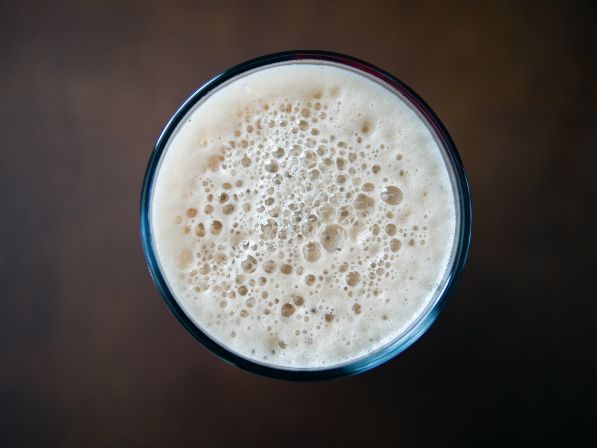
Every beer has an estimated “best by” date, which is the length of time the brewery believes the beer will continue to taste good if it is kept cold. Even beer that has been refrigerated will go bad over time.
How Long Must Cold Beer Remain Cold?
Does beer have to stay cold after being chilled? No, not at all; there won’t be any significant damage if you bring it from the fridge to room temperature. Even if you don’t want to repeat this process every time, the beer is still palatable if it is warm.
Can You Leave Beer In A Car?
When water freezes, it expands. Wine, soda, beer, or any other bottle containing water can explode in your car, creating a sticky mess in its wake.
Does Alcohol Go Bad If Left In A Hot Car?
Don’t leave a bottle of liquor (such as Wild Turkey) lying on its side if there is a cork in it and the overwrap is the only thing keeping it from breaking because the heat may cause the whiskey to expand just enough to cause minor leaking. Although there won’t be much of a loss, it’s still nice.
Should You Serve Beer Warm Or Cold?
As long as there is no ice forming on the top, he advises Prime to err on the side of caution and serve food at a temperature closer to that of the refrigerator. Due to the high alcohol content of brewery beer, it is possible to serve it at or just below 32 degrees Fahrenheit without it freezing. Further Reading: Can I Put Ice Cubes In Beer?
Can Stale Beer Make You Sick?
Although it’s not a good idea to consume beer that has passed its expiration date, you should be aware that, in most cases, a bad beer won’t make you ill or even kill you. You should at most anticipate a mild stomachache, along with a tinge of disappointment and disgust.
How Do You Recognize A Bad Batch Of Beer?
Although there are many strange beer varieties available, if the flavor you’re tasting is not what the beer is supposed to taste like (like sewage or cabbage), it should be fairly obvious. Some signs of a bad beer include the flavors of cooked cabbage, sewage, sulfur, and an unusually acidic taste.
Tips On How To Store Beer
- Store your beer in the proper position.
- Store your beer away from the light.
- Keep it cold!
- Rotating is not just for bars and grocery stores.
Does Unopened Beer Go Bad?
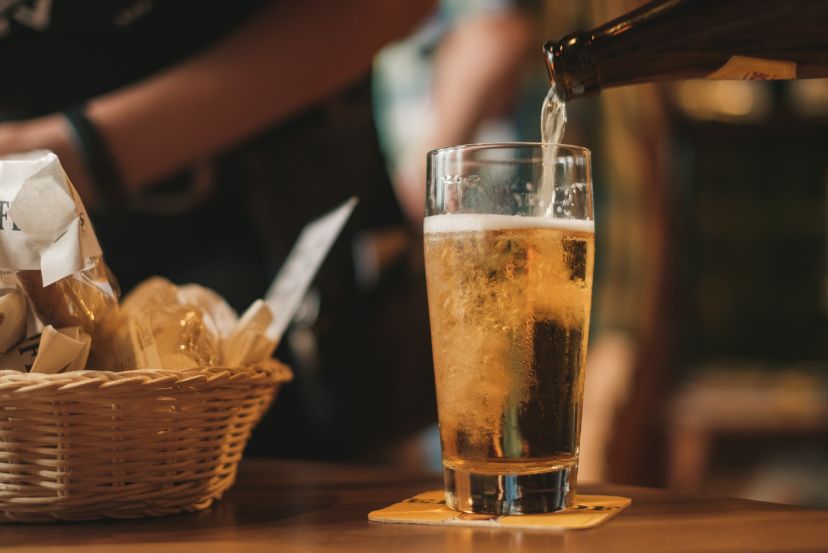
Unopened beer can spoil, yes. If stored in a cool, dark place, unopened beer has a shelf life of about six to eight months. Unopened beer will only keep for two to three months if kept in a warm, humid environment. Within a week or two of opening, beer should be consumed.
There are many myths surrounding the storage of beer, such as how temperature and light affect it. The most important thing you should know about beer is that it prefers light and should be avoided at all costs. It should be fine if you left your beer in the trunk for a few hours and the cans got a little warm.
Keep beer bottles that have not been opened at a temperature of any less than 32 degrees Fahrenheit. At room temperature, most brews will stay fresh for at least six months and approximately four months.
The beer won’t be as palatable as it could have been as the flavor profile deteriorates over time. Since it is not meant to be consumed right away, this type of beer should be kept in a cellar for a few years. If the bottle or can is sealed and not leaking, you can use it for a long time. The food should be thrown away if it tastes flat or stale because it has passed its prime.
Should Craft Beer Be Stored Cold?
Yes, craft beer should almost always be kept chilled. The ideal beer requires a lot of work to create, and it’s very simple to ruin it by simply storing it incorrectly.
The fact is that craft beer is more than just a cool beverage. Similar to experts in fine wine, beer experts advise very specific storage and serving temperatures to ensure the finished product is exactly as the brewery intended.
The mistake of simply placing bottled and canned beer on the shelf and selling it at room temperature may be the most typical. After all, customers can put it in the refrigerator when they get home.
What Not To Worry About Beer?
While the temperature at which beer is stored is important for flavor, aroma, and a number of other aspects of the beer experience, there are some other factors that are less important.
Don’t Worry About Storing Bottles Upright
Many people now believe that beer bottles must be stored lying down, just like wine bottles, due to the relatively recent trend of corking beer bottles.
This is not required. They can be kept upright, sideways, or even upside down. The direction of your storage for beer is not as important as it is for wine because beer usually does not have the sediment and settling issues that wine does.
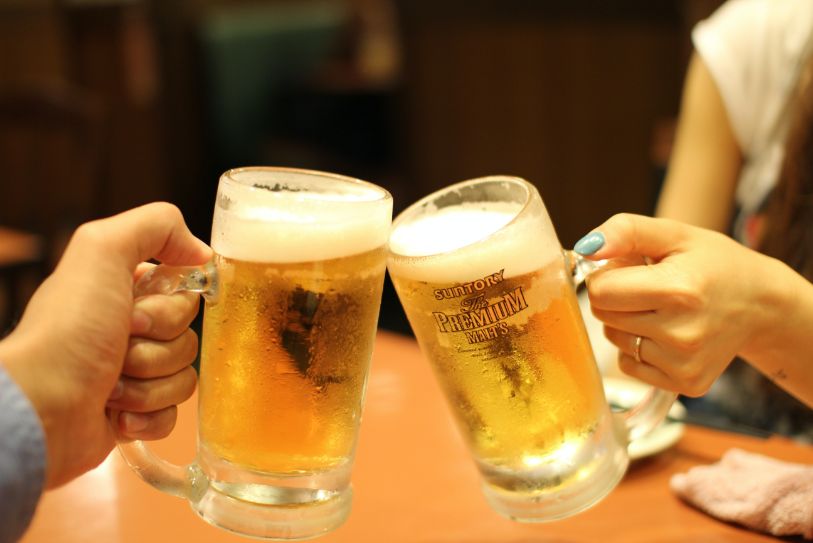
Don’t Worry About Storing It At Store Temp
Don’t worry about replicating the storage temperatures used by the market where you purchase your beer; it’s likely that they have no idea what the ideal temperature for beer storage is. Without permanently changing the flavor, beer can get a little colder or a little warmer. Your goal in beer storage is primarily one of serving it at the proper temperature.
Warm Beer Won’t Skunk
Nope. It’s only light that does that. Referring to the earlier warning about market storage, if your beer starts to get a little warmer than you’d like, just move it to a cooler location or lower the temperature in your refrigerator. A slight temperature change during storage won’t result in long-term harm to the flavor or aroma.
Beer storage temperature is ultimately a matter of taste and personality. If you are a seasoned beer connoisseur or aficionado, the temperature will matter a lot to you and you will experiment with different temperatures for various beers. Or you’ll probably decide to spend money on a beer fridge to store beer properly.
If not, keep them all at a cool 54 degrees Fahrenheit and enjoy your frosty beverage at your leisure, without giving it any thought, if you simply enjoy a good cold beer and aren’t too particular about the complexity of flavor and aroma.
FAQs
How Many Times Can Beer Get Hot and Cold?
In actuality, it’s not a big deal (unless you plan to cellar your beer). Hoppy beer is more sensitive to temperature changes, but if you plan to drink the beer within the next 30 to 45 days, 1-2 cycles of cold and room temperature will not affect the flavor.
Does Beer Get Skunked If It Goes from Cold to Warm?
That being said, it is an old pervasive myth that cold beer, when warmed to room temperature, will go “skunky” or bad. Skunking, which has nothing to do with temperature, is a reaction brought on by light interfering with a chemical compound found in hops.
Can Beer Get Skunked?
The beer temperature myth is most often expressed as follows: If a beer has been chilled, then allowed to warm up, then gets cold again, etc., it will be ruined and undrinkable. Repeated cooling and rewarming a beer will skunk it.
Conclusion: Store Your Beer Properly
Can cold beer become warm and then return to being cold? Skunking, as it turns out, has nothing to do with allowing a cold beer to warm up. Depending on the beer, most have a short shelf life and start to lose flavor after a few months or maybe a year. But UV light and the resulting photo-oxidation are the biggest enemies of beer.
Therefore, the next time you visit your neighborhood brewery taproom in search of fresh bottles or cans of beer to take home, don’t worry about transporting them from the to-go fridge to your warm car and then placing them in your own fridge to chill again.
It should still taste as good as when you first bought it as long as your car doesn’t get too hot and your trip doesn’t take weeks.


